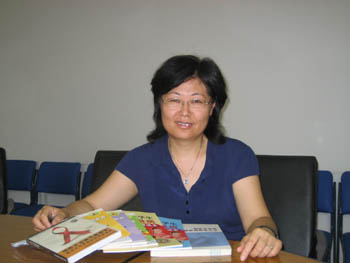| Home / Education / News | Tools: Save | Print | E-mail | Most Read |
| More Sex Education Needed in China - Expert |
| Adjust font size: |
Chinese students need more intensive sex education "not only for the prevention of HIV but also for personal health," UNAIDS executive director Peter Piot was quoted as saying last week on a visit to China. While Piot praises the government for "taking a strong leadership" in this issue, there are still many gaps in how sex education is filtered down to young people. Ma Yinghua, a senior councilor with 11 years' experience in health and AIDS education for students from primary to college, told chinadaily.com.cn Wednesday that not only teachers should talk about sex education, but parents too. Also a professor with
Ma Yinghua, a senior councilor with 11 years' experience in health and AIDS education for students from primary to college. Picture taken on July 25, 2007. "Most parents don't think it's important for their children to have health classes including sex or AIDS prevention knowledge," she said. "It's the academic courses they care most about." A hard job in practice "In In 2001, new guidelines for the school curriculum were set, incorporating the health education class with physical education, diluting the importance of the topic. In the "Physical Education and Health" lesson, areas such as health and fitness, nutrition, and disease prevention are covered. Education about sex doesn't start until Grade "But in the rural areas where a considerable number of students are 'left-behind children', students don't have as much education as the ones in the cities -- not to mention health education or even sex knowledge," said Ma. The government sponsors her to train teachers to instruct students about health education. When she first started doing this in 1996, the majority of the teacher trainees didn't even know what AIDS was. A decade later, the teachers are knowledgeable about the subject, but are now finding ways to teach it more effectively to students. But there is also the problem of school administrators not allocating enough class hours for sex and AIDS education. "That makes me frustrated," Ma told the reporter. Attitude that matters The general public connects sex education mostly with how to use condoms, but not the attitude towards sex behavior and the responsibility having sex. "That's also one of the reasons why Chinese parents are worried about sex education for their children, as they see it as corrupting their minds," Ma said. However, few young people share their problems around sex with their parents because they might not know the correct knowledge and the ways to talk about it. According to a survey by a first-aid hotline for pregnant teens in "Parents are responsible for their children's sex knowledge from a very early age," said Ma, "so that when they enter the school, they already know something about it." "There should be more communication between parents, teachers and schools through meetings and with the children at home," continues Ma. "Schools need to pay more attention to students' acceptance of sex and AIDS knowledge and teach them more life skills involving solutions to possible situations in daily life through interactive ways." Different ways and different stages The 2003 But Ma doesn't think this is enough. Also, learning how to use a condom isn't taught until college. "It's better to start teaching students how to use condoms in senior high," she said. "It's also vital for vocational schools to have this kind of lesson." Some local governments like But rather than textbooks, practical tips and methods taught in class are more important, says Ma. Most schools prefer to hold lectures for students on sex education, not small classes of interactive lessons, which are more effective. Also, those who actually teach the sex education classes are not qualified instructors. "80 percent of the trainees I give lessons to are school doctors and nurses who might lack enough teaching qualifications," said Ma. "They should be biology psychology or health teachers who know how to make teaching more effective. "We need more sex educators other than those at school," she said. ( |
| Tools: Save | Print | E-mail | Most Read |
 |
| Related Stories |
|
